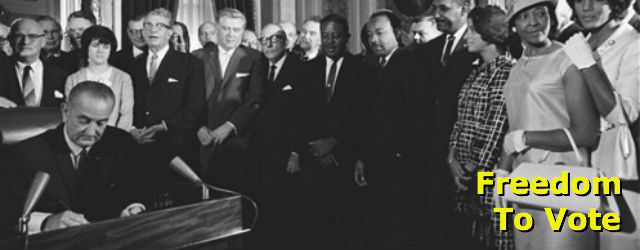Rep. Eddie Armstrong: Voting Rights Act Of 1965 Crucial
by August 6, 2015 2:36 pm 328 views

Rep. Eddie Armstrong, D-North Little Rock, said Thursday that the signing of a bill 50 years ago helped pave the way for lawmakers like him as well as giving people the right to vote.
“It was a momentous time. Not a day goes by. I cried the night I was elected and I cried the night I won the primary. There would be no Eddie Armstrong today without the Voting Rights Act (of 1965),” said Armstrong, who is black, of the bill that was signed into law by President Lyndon Johnson on Aug. 6, 1965.
The bill aimed to eliminate discrimination in voting.
In a story Thursday in Time magazine, author Maya Rhodan recalled coverage of the bill signing a half century ago.
On Aug. 6, 1965, Johnson closed one chapter of America’s history of denying black Americans the right to vote. For nearly a century, the words of the 15th Amendment, which guarantees the right to vote regardless of “race, color, or previous conditional of servitude” had been rendered useless by subversive tactics like secret ballots, poll taxes, literacy tests and other discriminatory practices that essentially made it impossible for most blacks to cast a ballot.
“It was like a stirring march that was written but never played,” TIME wrote of the 15th Amendment in 1965. Between 1890 and 1908, seven southern states had constitutional amendments that established poll taxes and grandfather clauses — which gave leeway to poor whites looking to vote, as long as their ancestors had voted before 1867 — and stripped African Americans of their voting rights.
For Armstrong, the issue is personal.
His great-grandparents did not have the right to vote, Armstrong said, noting several states in the South used poll taxes and literacy tests to stop people from voting.
Armstrong, who serves as House Minority Leader in the Arkansas House, said voting gives people an opportunity to take part in the electoral system in an effort to shape public policy.
But many people take the right for granted, Armstrong said.
Armstrong works with a group, Rock AR Vote, that stresses the importance of voting in elections. He said the work with young people has been rewarding and there has been an uptick of people voting in presidential years compared to off-year elections.
The group’s main focus is education, engaging people in the process and holding people accountable, Armstrong said.
“If I am not doing my job, I should be removed,” Armstrong said on the issue of accountability.
As for voting, he said young people vote every day, whether it involves television shows like “American Idol” or purchasing a cell phone app.
Some states, like North Carolina, hold mock elections for young people to vote in state and federal elections, Armstrong said, noting young people get an opportunity to look at the issues or a candidate without the rhetoric or negative ads.
Armstrong said he recently spoke to a national panel, affiliated with a fraternity, about the issue of minority voting trends.
One college student asked Armstrong about African-American ties to the Democratic party, with an assumption that “since the panel was all African-American, they are all Democratic.”
Armstrong said the African-American vote has shifted somewhat in Arkansas’ history.
In the state’s early history after Reconstruction, African-Americans voted Republican before shifting allegiances, Armstrong said.
However, Republicans like former Gov. Winthrop Rockefeller, former Gov. Mike Huckabee and former Lt. Gov. Win Rockefeller won in the past 50 years after getting strong percentages of the black vote, Armstrong said.
